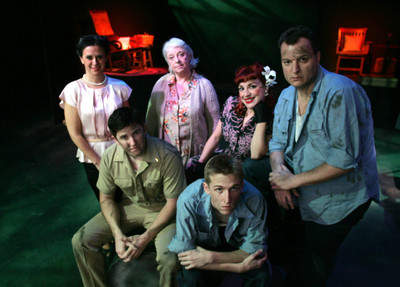Remembering the Fallen

They survived for 29 days, without ever really surviving at all.
Three men. An iron tomb. The bottom of the ocean.
Hundreds of feet above them, Pearl Harbor burned, destroyed in an instant, like paper on fire.
Their demise would come much more slowly, breath by breath, until there was nothing left to breathe.
Their remains would be discovered the following year, during the razing of the USS West Virginia, a sunken battleship rendered a scrap metal crypt.
The last days of this trio of sailors would be detailed by writings on the ship’s bulkheads, which would serve as their epitaph.
This is the basis for “Purple Hearts,” a dramatic production opening at the Las Vegas Little Theatre this week.
The play is a study in how we confront our mortality, something with which the show’s director, Paul Thornton, has an intimate acquaintance.
“Earlier this year, I was diagnosed with an illness that has really made me think,” says Thornton, declining to name his malady. “It’s an illness that’s going to continue to progress, and there’s nothing I can do about it. So (‘Purple Hearts’) does have a certain relevance to me.”
A veteran of the Las Vegas Little Theatre since the early ’80s, Thornton first staged a production of “Purple Hearts” two decades ago, before deciding to revisit it earlier this year at the behest of a former assistant director.
“I was really kind of afraid, at first, to jump into this,” Thornton admits. “I said, ‘Oh my God, is this cast going to be able to grasp everything and move these characters forward the same way the first cast did?’ Because we got really good reviews, we won a couple of awards 20 years ago. And through the course of the rehearsals here, what’s really impressed me the most is that these actors have found new things that we didn’t find 20 years ago. While it’s the same script, it’s almost like a whole different production.”
With an ensemble cast, not only does the play examine how these men face their fate, but it also tells the story of the women they have left behind, examining the full extent of a life lost.
It’s a timely production, not only because many American families are dealing with the fallout from war and the human toll it exacts, but because the conflict it’s centered around is beginning to fade into history.
“All the guys who were in World War II, they’re getting up there,” Thornton says. “With the current war we have in Iraq, and the Gulf War and the Vietnam War, it seems that people are starting to kind of forget. This is a show that’s going to bring it back to people’s awareness. Of course, things in history have a tendency to fade in memory, and eventually they’re just kind of gone. I think it’s still too soon to be relegating it to a page in history.”
As Thornton speaks, it becomes clear how personally invested he is in telling this story. A civil engineer by day, the theater is a labor of love for him — as it is for pretty much everyone involved.
“We’re all volunteers at the theater, none of us gets paid, so we have the day job that pays the bills for us,” he says. “You leave work, you go from the office to the theater, you’re at the theater until 10-10:30 every night, then you go home, try and get some sleep, and do it all again the next day. When you’re acting or directing a show, you do that for anywhere from six to 10 weeks.”
Still, there’s no weariness in Thornton’s voice as he talks up his latest production during his lunch hour on a recent Thursday afternoon. “Purple Hearts” revolves around life and death, love and longing, and it doesn’t take long to discern that Thornton doesn’t take any of it for granted.
“On one hand, life goes on,” Thornton says. “But on the other hand, we shouldn’t forget the horrors of war. These are real people who went through this.”
Contact reporter Jason Bracelin at jbracelin@reviewjournal.com or (702) 383-0476.